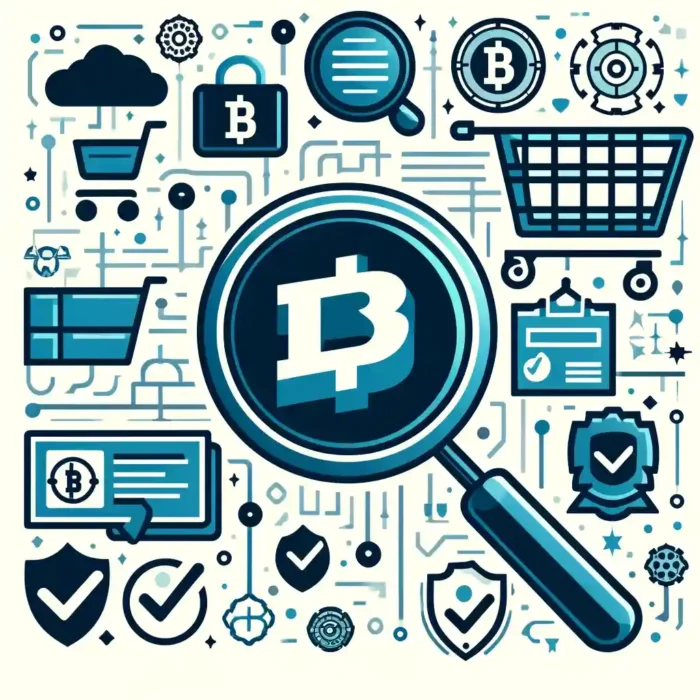Get Scam Alerts & The Latest Crypto News:
In the bustling bazaars of the digital world, where invisible transactions dance like sand in a frantic desert storm, a new player has emerged – Blockchain. This innovative technology, as enigmatic as the cryptographic algorithms it relies on, is forging a new path in the realm of retail, promising immense possibilities and unparalleled transparency. But like a glistening oasis in that same desert, it brings with it a mirage of challenges, particularly in the realm of due diligence. This article ventures into the labyrinth of retail blockchain applications, unmasking its potential, and unravelling the complexities wrapped around its due diligence challenges. So, buckle up, and prepare for an odyssey into the intriguing world of retail and blockchain, where every bit and byte tells a story.
Unveiling the Potential of Blockchain in Retail
Blockchain technology, most notably known for underpinning digital currencies like Bitcoin, is starting to make waves in the retail sector. The technology’s core benefits of decentralization, immutability, security and transparency can help retailers to enhance customer experience, streamline supply chain management and ensure the authenticity and quality of goods.
One of the biggest potential applications of blockchain in retail is in supply chain management. Blockchain can provide a shared, secure record of information flows — for instance, a chronological history of a product’s journey from raw materials to retail shelf. This can help to reduce fraud, counterfeiting and human error, and increase efficiency and transparency. Other potential applications include loyalty and rewards programs, payments and consumer data management.
- Supply chain management: Blockchain can help track the origin and movement of goods, reducing the risk of counterfeit products.
- Loyalty and rewards programs: Blockchain can make it easier and more secure for customers to earn and redeem loyalty points.
- Payments: With blockchain, retailers can offer secure, instantaneous and low-cost international transactions.
- Consumer data management: Blockchain can give consumers control over their personal data, enhancing privacy and trust.
However, implementing blockchain technology is not without challenges. One of the main obstacles is due diligence. With the novelty of blockchain technology, regulatory frameworks are still being developed. This requires retailers to exercise a high degree of caution and due diligence when implementing blockchain-based solutions. Other challenges include technical difficulties, scalability issues and the need for a cultural shift within organizations.
| Due Diligence | Retailers need to ensure they comply with yet-evolving regulatory frameworks. |
| Technical Difficulties | The complexity of blockchain can present implementation challenges. |
| Scalability Issues | Blockchain applications need to be able to handle high volumes of transactions. |
| Cultural Shift | Organizations need to embrace a new way of thinking about trust and security. |
Transforming Retail with Blockchain: Innovative Applications
The retail industry is already witnessing transformative changes with the integration of Blockchain technology. One of the most significant applications is supply chain transparency. Retailers can now track products from the point of origin to the store, ensuring the authenticity of goods and minimizing the risks of counterfeit products. Customers, on the other hand, can be confident about the quality and source of their purchases.
Another innovative application is payment integrity. Utilizing blockchain technology, retailers can offer more secure and transparent transactions. This not only reduces fraud but also speeds up the transaction process. For instance, with blockchain, real-time payments can be a reality, eliminating the delays typically associated with traditional banking systems.
As promising as these applications are, there come certain due diligence challenges. Since the blockchain is a decentralized system, it raises questions regarding data privacy and security. Retailers must ensure that they are complying with data protection regulations while providing transparency. Also, with blockchain being fairly new, it requires a significant learning curve and infrastructure adaptation for full-scale implementation.
The following table summarizes the key blockchain applications in retail and associated challenges:
| Blockchain Applications | Challenges |
| Supply Chain Transparency | Complexity of tracking multiple components |
| Payment Integrity | Integration with existing payment systems |
| Data Privacy | Compliance with data protection regulations |
| Security | Management of decentralized system |
Regardless of the challenges, the potential of blockchain in reshaping the retail industry is undeniable. As the technology matures, we can expect more innovative applications and solutions to overcome the hurdles.
Beyond the Hype: Due Diligence Challenges in Retail Blockchain Adoption
Despite the hype and promise surrounding blockchain technology, its adoption in the retail sector has been far from seamless. As retailers contemplate integrating blockchain into their operations, they must grapple with a range of due diligence challenges that could potentially derail their blockchain initiatives.
One of the most pressing challenges is understanding the complex regulatory landscape that surrounds blockchain. Regulatory standards and laws for blockchain vary greatly from one jurisdiction to another and are still in flux in many areas. Retailers must ensure they are fully aware of and compliant with these regulations to avoid potential legal and financial pitfalls.
- Understanding the technology: Blockchain is a complex technology that requires a solid understanding to implement effectively. Retailers must invest in education and training to ensure their staff can manage and utilise the technology effectively.
- Security concerns: While blockchain is touted as being highly secure, it is not impervious to breaches. Retailers must ensure that their blockchain systems are protected against potential cyber-attacks.
- Integration into existing systems: Integrating blockchain into existing retail systems can be a significant challenge. Retailers must carefully plan and manage the integration process to minimise disruption and ensure the technology is implemented effectively.
- Cost implications: Implementing blockchain technology can be expensive. Retailers must carefully consider the financial implications and ensure they have the necessary budget in place.
| Blockchain benefit | Due diligence challenge |
|---|---|
| Enhanced security | Addressing potential vulnerabilities and ensuring robust protection against cyber-attacks |
| Improved transparency | Ensuring compliance with complex and varying regulatory standards |
| Increased efficiency | Successfully integrating the technology into existing systems without causing disruption |
| Cost savings | Assessing the financial implications and securing the necessary budget |
While overcoming these due diligence challenges may seem daunting, the potential benefits of blockchain technology for the retail sector are significant. By carefully navigating these hurdles, retailers can leverage blockchain to improve security, increase transparency, enhance efficiency, and reduce costs. However, a cautious and informed approach is essential to ensure the successful adoption of blockchain in retail.
Strategic Approach: Overcoming Blockchain Implementation Hurdles in Retail
Blockchain technology is increasingly gaining traction in the retail sector, with potential applications ranging from supply chain tracking to customer loyalty programs. However, implementing this technology in retail is not without its challenges. In this post, we will look at some strategic approaches to overcoming these hurdles.
One major hurdle retailers face when implementing blockchain technology is a lack of understanding and technical expertise. Proper education and training about blockchain can mitigate this issue. Retailers can hire blockchain experts or train their employees through seminars, online courses, and hands-on workshops.
Key strategies to overcome blockchain implementation hurdles:
- Education and training: Invest in educating employees about blockchain technology and its potential applications in retail.
- Collaboration: Partner with blockchain technology providers or join blockchain consortiums to leverage shared expertise and resources.
- Incremental implementation: Start with small pilot projects to test the waters and gradually scale up as you gain confidence and expertise.
- Regulatory compliance: Stay abreast of the latest regulatory developments in blockchain technology to ensure compliance.
Another significant challenge retailers may face is the high cost associated with blockchain implementation. A strategic approach to this hurdle would be to start with small pilot projects. This allows retailers to test the waters and determine the viability of the technology for their particular needs before fully committing.
Furthermore, blockchain technology still operates in a somewhat grey regulatory area. To address this issue, retailers should maintain a close eye on the latest regulatory developments in the sector. They should also seek legal advice to ensure that their blockchain initiatives are fully compliant with the law.
Challenges in blockchain implementation:
| Challenges | Strategies |
|---|---|
| Lack of understanding and technical expertise | Education and training |
| High implementation costs | Incremental implementation |
| Regulatory uncertainty | Regulatory compliance |
While blockchain technology offers promising prospects for the retail sector, careful strategic planning is crucial to overcome the associated implementation challenges.
Turning Challenges into Opportunities: Recommendations for Retail Blockchain Integration
In the ever-evolving retail landscape, blockchain technology represents a transformative opportunity for enhancing operations, streamlining supply chains, and securing customer data. However, integrating this cutting-edge technology brings its unique set of challenges which, if navigated effectively, can serve as catalysts for innovation and growth.
Blockchain Applications in Retail
- Supply Chain Transparency: Retailers can leverage blockchain to create a tamper-proof log of product journeys, from source to store. This transparency can enhance consumer trust while improving accountability within the supply chain.
- Data Security: Blockchain’s decentralized, encrypted nature offers a robust solution for securing customer data, and addressing privacy concerns.
- Loyalty Programs: By tokenizing rewards on the blockchain, retailers can create efficient, transparent and engaging loyalty programs.
Challenges and Recommendations
Engaging with blockchain technology requires a strong understanding of its capabilities and constraints. Retailers must conduct due diligence to assess the feasibility and potential return on investment. Below are some challenges retailers may face and strategies to leverage them into opportunities.
| Challenges | Recommendations |
|---|---|
| Understanding Blockchain Technology | Invest in education and professional development to build internal expertise. |
| Infrastructure Integration | Collaborate with technology partners to ensure seamless integration with existing systems. |
| Data Privacy Regulations | Conduct comprehensive audits to ensure blockchain applications comply with local and international regulations. |
While blockchain technology presents a series of challenges for retailers, it also offers a plethora of opportunities. With a proactive approach and a clear understanding of the technology, retailers can leverage these challenges into opportunities for innovation and growth.
Final Thoughts
And thus, the dance between blockchain technology and retail continues, each learning to move with the other, and each challenging the other to step up. A promising partnership, yet fraught with hurdles of due diligence that must be navigically skillfully. The path ahead is both exciting and fraught with a labyrinth of challenges, but the potential rewards are too rich to ignore. As with any innovative technology, a prudent approach is necessary. Let’s continue to watch this space with curiosity, as blockchain may just be the sleeping giant that could awaken and revolutionize retail as we know it. But until then, the symphony of retail and blockchain continues to play, and it’s up to us to listen carefully, participate intelligently, and make informed decisions.

